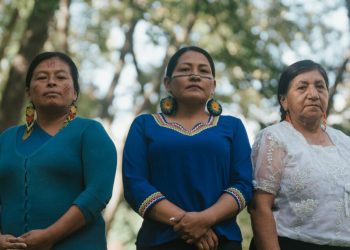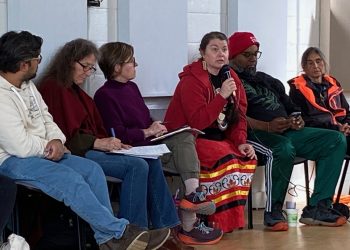Indigenous leaders from the Assembly of First Nations (AFN) have called for Ottawa to intervene in the tax-agreement dispute between First Nations and Premier Blaine Higgs.
“Why shouldn’t the federal government be working with the provincial governments to make that happen?” said Joanna Bernard, AFN Regional Chief, New Brunswick.
The New Brunswick government announced the termination of tax agreements with First Nations on April 13, 2021.
Later in the year, the provincial government reportedly agreed to delay the cancellation of tax agreements with six Wolastoqey communities until 2023.
With revenue-sharing agreements set to expire, the AFN has called for the feds to step in.
Bernard said she brought up the issue during a brief meeting with Justin Trudeau, but the Prime Minister said there’s little he could do “because it’s a provincial thing.”
Bernard is concerned the situation with the current provincial government will only get worse.
“I just worry about Higgs not seeing the big picture,” she said.
National Chief RoseAnne Archibald said in a statement that Prime Minister Justin Trudeau should “act on his fiduciary obligation to protect First Nations people and Treaties from encroachment, including from provincial governments.”
The AFN says the funds allowed for Indigenous-led programs to address poverty and other social issues, and that the premier has cancelled the agreements with no plan to support those programs.
Check out the interview with Joanna Bernard, AFN Regional Chief, New Brunswick:
The provincial government has termed the agreements “unsustainable and unfair.” Instead, it asked First Nations leaders to come to the table to “co-create a modern and sustainable economic partnership.”
Under the terms of the cancelled agreements, the province refunds “95 per cent of the first $8 million collected in provincial sales tax and 70 per cent on amounts thereafter,” according to the April 2021 statement from the government.
The refunds grew from $28,000 annually in 1997, reaching a peak of $47 million in the 2019-20 fiscal year. The provincial government says New Brunswick is the only province that has provincial sales tax agreements with First Nations communities.
Province responds
In response to queries from the NB Media Co-op, the provincial government provided copies of letters signed by Arlene Dunn, Minister of Aboriginal Affairs. The most recent one is addressed to the six Wolastoqey chiefs and dated Dec. 15.
That letter says “the Province will not extend the Wolastoqey Tax Agreements.” It says those agreements terminate on January 31, 2023, while the AFN statements refers to agreements expiring at the end of 2022.
Dunn states in her letter that the provincial government “is prepared to provide the necessary funds through a new economic partnership focused on the ‘housing, healthcare, social assistance and education needs in First Nation communities’… to improve the lives of all First Nations community members across the Province.”
Dunn also states that “the Province considered the tax agreements to be outdated mechanisms that did not provide for a balanced distribution of benefit between all First Nation communities and their members.”
Between 2004/2005 and 2020/2021, the total amount paid to the Mi’gmaq First Nations was about $45 million, 13.8 per cent of the amount paid to the Wolastoqey First Nations, which stood at about $326.5 million, according to the province.
‘Economic genocide’
Bernard said that the provincial government has deprived First Nations communities of fair revenue-sharing and committed an “economic genocide.”
“We’ve been using those taxes to subsidize the programs that exist in our communities,” she said. “But the genocide here is where [Higgs] is going to take that money and tell us how to spend it, what he thinks is best for us. That’s just not going to work.”
In her letter, Dunn briefly noted talk of economic genocide, saying: “There is no basis for these statements and we will not address these comments further at this time,” except to note that the government has committed to provide necessary funds through “a new economic partnership.”

![Feds must intervene in tax-sharing dispute between Higgs, Indigenous communities: AFN [video]](https://nbmediacoop.org/wp-content/uploads/2022/12/joannabernard-750x536.jpg)







![Is pollution from industry causing the neurological disease ALS in New Brunswick? [video]](https://nbmediacoop.org/wp-content/uploads/2025/10/Quintin-Soloviev-Belledune_Generating_Station_in_New_Brunswick_Canada-120x86.jpg)

